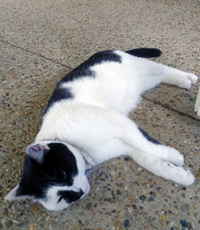Jan's story

'Kev's been my rock,' she says.
'I don't know how he does it.'
Jan and Kevin have been together for 22 years. Jan has cerebral palsy (CP) and chronic arthritis. She met Kevin through a dating agency, and told him about her disability from the outset.
'I was fairly blunt,' she says.
'I thought, I'm going to be upfront over the phone... and within 18 months we were married.'
Jan discusses:
- having a family
- living with mental illness.
Having a family
Jan says the couple always wanted to have a family.
'I think life would have been very dull (without kids),' she says.
'For Kev and I, what else would you do in life? What else would you do without kids? Having kids has helped me to get on with life and have a go.'
Jan says she experienced difficulties when the girls were younger because of her disability.
'We had a lot of challenges,' she says.
'We applied to Logan Council so the wheelchair could go on a hoist so I could get the kids out of the car.'
Taking her daughters to the shops to buy food required planning as well.
'To get there and there wasn't a park after getting the kids in the car...' recalls Jan.
'It was a big effort.'
The two girls, however, were willing to help out-if and when they could.
'Kids don't like being asked to do chores, but they were so patient,' says Jan.
'They just saw it as "helping mum". Kids are tuned into it (disability).'
Jan says parenting has been harder than she—or Kevin—had anticipated.
'It's hard because you care,' she says.
'I want to do the best by my kids.'
The couple's daughters are now in high school. As a young carer, one of the girls participates in activities organised by Young Carers Project (Brisbane South).
Jan says she has realised you are ‘always a mum', even as your children become teenagers and young adults.
'That's a nice thing, especially if you have that open door,' she says.
'I think most families—if they are honest—have issues in one way or another. Whatever happens, mum and dad are here.'
Living with mental illness
Jan has chronic depression. She experiences ongoing pain with her arthritis, and has noticed a decline in her physical abilities.
Jan says it took time for her to realise she needed support with her mental health.
'I think I've had depression for a long time and it's gone undiagnosed,' she says.
'I've had to come to the point where I've had to ask for help.'
Jan says having ‘a support network that gets it' makes a huge difference in her life.
'Kevin has accepted depression is a real thing and it's not something that people choose,' she says.
'Depression doesn't come from: "Stop being so negative and get on with your life". It's not as easy as: "Put a smile on, be grateful for what you've got and keep going". You need an awesome partner or support network, and an awesome GP (general practitioner) willing to look outside the square.'
For one of her daughters, says Jan, spending time with other young carers has given her an appreciation of other young carers' experiences.
'For me, it was a relief that my daughter could identify and realise that depression is real, and that there are many families out there where you (as a child or teenager) have to put the socks on the line... and where your parent doesn't always get out of bed,' says Jan.
Find out more
Around 1 in 5 Queenslanders—or 500,000 people—will experience a mental health issue in any year. More than half of these people won't seek help.
If you need emergency help, call Triple Zero (000) now.
There is information to support you with maintaining your mental health and wellbeing. You can find out about:
